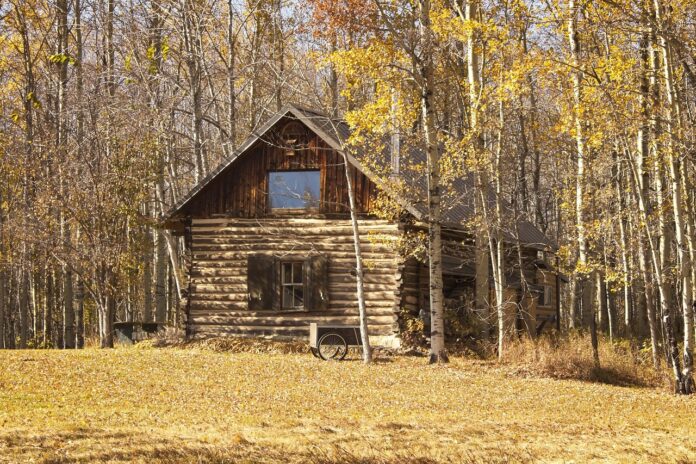Have you ever wondered what it would be like to retire in a cabin in the woods? My dad did it, and I’m here to share some fascinating insights on his experience and how he ended up there.
Who knows, if you prescribe to Lean FIRE, it might be just the type of retirement adventure you’re looking for! Or, it may give you a new appreciation for the ease and comforts of city living.
For starters, my dad grew up in a small town nestled between the Allegheny and Appalachian Mountains. And when I say “small town,” I’m referring to just 2,000 people.
It’s one of those places where job opportunities are limited, many struggle with substance abuse, and people are always poking into each other’s business. You can’t go anywhere without being recognized or seeing people you know.
From a young age, spending time in the woods was my dad’s way of escaping the lookie loos and trouble makers. Immersing himself in nature provided serenity and endless adventures.
Building A Cabin In The Woods
My dad was very fortunate that his father purchased 50 acres of forest land about a 15-20 minute drive away from their home when he was a boy. They called it “the farm.” It was pure untouched wilderness that my grandfather hoped to build a house on some day.
My dad frequented the farm growing up. He daydreamed of building a cabin there while he chased critters and watched the sky. The land had hills, steep ridges, several creeks, small clearings (open areas in the forest), wildlife, and trees as far as his eyes could see.
He started working and saving from a young age, and quickly developed a knack for building and fixing things. His skills led him into many jobs over the years: landscaper, painter, handyman, bartender, waiter, construction worker, electrician, and foreman.
So if anyone could build a cabin, it was my dad. And that he did with his own two hands!
Building the cabin certainly didn’t happen in the course of weeks or months. It took years and is still technically unfinished. But he got enough of it built to live there during his 20s and in the early years of married life.
Moving To Suburbia
Before I was born, my parents moved into a rental house mostly due to my mom’s behest. But he continued to tinker on the cabin in the years that followed.
Whenever he had enough money saved up, he’d tackle a new home improvement project. There were endless things he dreamed of building or enhancing. We also spent many weekends there hiking, collecting moss and pet rocks, searching for salamanders, watching the deer, and star gazing.
When it came time for me to start kindergarten, my parents wanted a stronger school system. So we moved to a central Virginian city with 40,000 people. It felt huge considering it was 20X the population.
Our new home was about a 2.5-hour drive from the farm and my grandparents. We were still relatively close by. But, it became quite a trek to go back and forth often. The cabin grew dusty and the clearings in the forest quickly filled with waist-high grasses, wildflowers, and snakes.
But my dad took as many trips as he could squeeze in to maintain the cabin and the land. And I always looked forward to the times I got to tag along and enjoy the outdoors.
Returning To The Cabin In The Woods To Reset And Retire
Fast forward to my dad’s mid-40s and my parents got divorced. My mom kept our small city home to finish raising me in, and my dad moved back to his cabin in the woods. And he’s lived there ever since!
All in, that’s about thee decades he’s lived in a cabin in the woods, about 15 of which have been in retirement.
My dad always dreamed about retiring there. Things just didn’t turn out exactly the way he hoped. Nevertheless, he can’t imagine himself living anywhere else.
To him, minimalism and early retirement go hand-in-hand.
Could You Retire In A Cabin In The Woods?
If the idea of escaping the hustle and bustle of city life appeals to you, please read on. There may be a lot of things you haven’t even thought about yet.
I don’t plan to retire in a cabin in the woods given we are used to city living and our children like their current schools. Sure I love nature and being in the outdoors. But from a lifestyle perspective, I’m too attached to technology, conveniences, and modern amenities.
What type of person would be a good fit for retiring in the woods?
Retirement Cabin Life May Be A Good Fit For You If:
- You’re an introvert
- Love the outdoors, bugs and all
- Want to be unplugged from the outside world
- Enjoy being self-sufficient
- You love the quiet, day after day
- Are handy with DIY repairs and home maintenance
- Savor the simple things in life
- Want to live in a low cost-of-living area
- You’re not the type to panic if a wild animal appears out of nowhere
- Are comfortable being alone for long stretches of time
- Enjoy reading a lot
- You’re heathy and don’t need frequent medical care
- Are able to maintain the surrounding lands or afford to hire help
- You’d rather rough it than live it up
What Is It Like To Retire In A Cabin In The Woods?
Below are some of the day-to-day realities that my dad has lived with in his atypical retirement lifestyle. Keep in mind his circumstances certainly don’t apply to every cabin in the woods out there.
And sure, with enough time, money, and resources, you could live in a cabin with all sorts of bells and whistles that he doesn’t have. But, perhaps that would defeat the whole purpose of living in the wilderness!
In any case, here’s a look at some of the challenges and perks that retiring in a cabin in the woods can offer.
Goodbye Cable TV, Streaming, Cellular, And WiFi
My dad is very much unplugged. Fortunately he likes it like that. He hasn’t had cable TV for the last 25 years, nor does he have a land line telephone or WiFi. He doesn’t even have dial-up internet! But he can listen to NPR or get newspapers from the grocery store.
Because his location is so far back from the closest road, it would cost several tens of thousands of dollars to have services like a land-line telephone installed.
He does have a cellphone, but there’s barely any signal. Sometimes he can pick up calls, but they often drop a minute or two later. He has to drive 15-20 minutes to town for reliable service.
Plus, because he lives within Green Bank Observatory’s National Radio Quiet Zone, there are lots of weird restrictions on transmissions and signals.
Hello Crockpot And Home Cooked Meals
Home-made meals are a must if you want to retire in a cabin in the woods. If you don’t already like to cook, you better live with someone who does or learn to like it!

My dad was not into cooking much at all when I was growing up, but he was good with a grill. Fast forward to his retirement life in the wilderness, and he is now quite the chef.
Cooking his own meals has been a necessity. And with enough practice and patience, he’s learned how to make some amazing stews, roasts, and vegetable dishes.
His signature breakfast is scrambled eggs with wild ramps. If you think garlic has a lot of flavor, wait until you try ramps. “They’ll knock your socks off!” he likes to say.
If my dad does want to go out to eat, it requires about a 35-40 minute drive one-way. And the choices over the years have been limited to establishments like Arby’s, Cracker Barrel, and a very Americanized Chinese buffet restaurant.
Raccoons, Coyotes, And Bears, Oh My!
Wildlife is a part of everyday life if you live in a cabin in the woods like my dad does. He regularly sees deer, wild turkeys, foxes, coyotes, bob cats, raccoons, black bears, rattlesnakes, opossums, skunks, bats, and a lot more.
His dining room window acts like his TV. He often sits there for hours just looking out the window waiting to see what will walk or fly by. He’s even befriended some of the animals, mainly the deer. But usually he just waits and watches nature’s free entertainment.
The biggest wildlife safety threat are black bears due to their size and aggression if startled. He’s seen and encountered hundreds over the years and can tell bear stories for hours.
Be prepared to encounter wildlife if you want to retire in a cabin in the woods. Understand the dangers, know how to avoid them, and be prepared to protect yourself if needed.
It wasn’t until I become an adult that I learned my dad is quite the marksman. It’s actually saved his life on more than one occasion. When you’re in the wild, unexpected circumstances can arise suddenly that require swift action to save your life. You need smart instincts and quick reflexes.
Get Ready For Insects Galore
And oh, did I forget to mention the bugs? Definitely don’t retire in a cabin in the woods if bugs give you the heebie-jeebies. There are bugs e-v-e-r-y-w-h-e-r-e, especially in the summer time.
Mosquitos buzzing in your ears at night, gnats attacking your face, spiders of all sorts, ants, biting horseflies, aphids, you name it. You will feel like you’re being eaten alive outside if you forget the bug spray.
Potentially Intense Allergies Living In The Woods
And don’t forget what comes with all of the beautiful trees, flowers, grasses, and plants – pollen. My dad has struggled with allergies for years and even taken allergy shots much to no avail.
His eyes got so swollen and puffy from allergies a few years ago that his lower lids couldn’t even support their own weight. It took surgery and many months for them to return to normal.
Trespassers Beware!
Another trouble with living in a large wooded area is you may have trespassers coming onto your land to hunt or just cause trouble.
My dad’s had to run off misfits, hunting dogs, and their owners many times. But fortunately most people know to steer clear of his property now. He’s not one to back down.
Social Isolation Has Its Pros And Cons
What’s probably the biggest challenge mentally is the high amount of social isolation that comes with retiring in a cabin in the woods. My dad had a dog for about 14 years which was huge for companionship. But now it’s just him by himself.
He’s always been a rather solitary person. So the perpetual quiet doesn’t bother him very often. One perk is rarely gets sick because he isn’t in regular contact with folks except when he’s running errands.
But not being able to reliably make calls from his cabin certainly makes things hard socially. Loneliness really creeps up on days when he doesn’t see any wildlife. He admits to talking to the animals for company, especially the deer, some of whom he’s bonded with.
It’s quite difficult to get him to come visit us in San Francisco as it requires long driving and a connecting flight across the country. He doesn’t like to leave his town and is quite the solitary outdoorsman.
Weathering Mother Nature’s Force
There’s also the challenge of weathering the natural elements when you retire in a cabin in the woods.
He’s experienced hurricanes, floods, lighting strikes, forest fires, droughts, bomb cyclones, snowstorms, freezing rain, black ice, and intense humidity.
And because he has so much land, when Mother Nature wreaks havoc, there’s often a lot to clean up and repair. He’s had issues with trees falling across his private drive, the road washing out, bridges collapsing, roof leaks, and more.
There’s also a lot of cabin maintenance involved due to the natural elements year round. He’s had issues with his well water going bad, the creeks drying up, bats getting inside the cabin, field mice moving in, restocking the wood pile in the winter, getting a new outhouse hole dug, keeping animals out of his garden, and so much more.
Limited Local Medical Resources
And another big challenge that comes with retiring in a cabin in the woods is limited access to medical resources. My dad had to go through a lot of hoops to get his cabin an actual street address so that he can receive ambulatory services if he ever needs help getting to the ER. Without a street address, he was told 911 can’t dispatch an ambulance to his location.
Access to doctors, medical specialists, and dentists is also rather limited in his neck of the woods. He has to drive about 45 minutes to an hour to the closest VA hospital where most of his doctors are. And he’s had to travel 2-3 hours one-way for certain specialists and surgical treatments.
How Much Money Is Required To Retire In The Woods
From a financial standpoint, you don’t need much money to retire in a cabin you built in the woods. With no mortgage, no cable, no wifi, no water bill, and covered healthcare insurance, my dad’s expenses are low.
He just pays for firewood, electricity, food, gas, a cheap cell phone plan, and car maintenance. On average, my dad spends between $500 to $800 a month, or $6,000 to $9,600 a year. All of his expenses can be covered by Social Security.
If you would like to retire off the grid at an earlier age, all you would need is about $150,000 to $240,000 in invested capital generating a 4 percent annual return. If you want to be more conservative, double the amounts to $300,000 to $480,000.
Retiring In A Cabin In The Woods Takes Independence To A Whole New Level
It takes a lot of independence to retire in a cabin in the woods. You have to be willing to cook your own meals, do a lot of maintenance and repairs by yourself, genuinely enjoy being unplugged and socially isolated, be healthy enough to not need close access to medical care, and be able to protect yourself from nature’s elements, wildlife, and trespassers.
It certainly isn’t the retirement lifestyle for most people.
But for my dad, it’s heaven on Earth.

Reader Questions And Suggestions
Readers, have you ever thought about retiring in a cabin in the woods? What would be the biggest challenges you’d face? What type of environment do you want in your retirement. For those of you who are already retired, are you happy in your rural area, suburb, or city? Or do you long for something quite different?
Sign up with Empower, the best free tool to help you better manage your finances. With Empower, you can track your investments, see your asset allocation, x-ray your portfolios for excessive fees, and more.
Also take a look at NewRetirement, software specifically built to help you with retirement. NewRetirement provides even more customization for different assets classes and retirement scenarios.
For more nuanced personal finance content, join 60,000+ others and sign up for the free Financial Samurai newsletter and posts via e-mail. Financial Samurai is one of the largest independently-owned personal finance sites that started in 2009.








